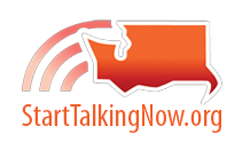
Parents are dealing with a lot right now. Many families are experiencing higher levels of stress and anxiety due to health and safety concerns and/or financial issues. In difficult times, it is especially important for parents to bond with their children, model healthy ways to deal with stress, talk with them about how they feel, and help them find positive ways to cope. Your children—no matter how old—notice how you manage stress. So remember to take time to care for yourself in healthy ways. It’s beneficial for you and for your child who is watching.
As COVID-19 has us all spending more time at home, your teen and young adult may also have more access to things like alcohol or marijuana. You can help them make healthy choices at home—and beyond. Set clear family rules and consequences, keep alcohol and marijuana locked away, model healthy ways to deal with stress, and make sure they know you’re always there when they need you. Below are a few tips for connecting with teens and young adults:
- Be calm: Children will pick up on your behavior and reactions. Reassure your children that your family is safe and discuss the steps you are taking to make sure your family is safe and healthy.
- Be available: Give your children the opportunity to share their feelings. They may push back at times but keep trying so they know someone who will listen is there for them. Help put their concerns into perspective and tell them how much you care about them.
- Be a role model: Modeling healthy ways to deal with stress—like exercising, getting outside, meditating, or reading—is important for your wellbeing and teaches your children healthy ways to manage stress.
If your child is feeling stressed or overwhelmed, support from a professional can really help. Below is a list of resources:
- Washington Recovery Help Line
The Washington Recovery Help Line offers anonymous, confidential help for those experiencing a substance use disorder or mental health challenge. The help line is open 24 hours a day. - Crisis Connections
Crisis Connections connects people in physical, emotional, and financial crisis to services. The crisis line is open 24 hours a day. - Washington Listens
In response to the COVID-19 pandemic, Washington launched a support program called Washington Listens to help people manage elevated stress and cope with the changes that have occurred.
Here are more tips on how to have effective conversations with your children about not using alcohol and marijuana.

